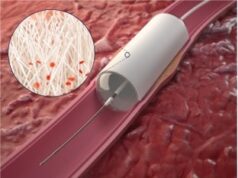Cook Medical has completed patient enrolment in a study evaluating the retrograde tibiopedal approach. The new access technique could be used in treating peripheral arterial disease, including for patients with critical limb ischaemia.
The tibiopedal access approach for crossing of infrainguinal artery occlusions study has enrolled 200 patients with completely obstructed lower-limb arteries.
The study is led by principal investigator Craig Walker, president and medical director of the Cardiovascular Institute of the South, Los Angeles, USA. Physicians participating in the study are evaluating the tibiopedal access technique, which is used to achieve vascular access via the foot in order to cross blocked arteries in the legs. This technique potentially offers vascular access to patients who otherwise may not have had an interventional treatment option.
Individual physicians have reported initial success with the technique, which is often tried after the traditional endovascular approach, usually via the femoral artery, fails.
Rob Lyles, vice president and global leader of Cook Medical’s Peripheral Intervention division said: “We hope that completing enrolment is an important step in bringing the below-the-knee technique to patients, many of whom have had other procedures fail.”
The study is being conducted at eight sites across the USA: Tucson Medical Center, Tucson, Terrebonne Medical Center in Houma, First Coast Cardiovascular Institute in Jacksonville, Metro Heart and General Vascular in Wyoming, Rex Hospital, Raleigh, Washington Hospital Center, Washington, West Virginia University, Charleston Area Medical Center, Charleston and Mount Sinai Medical Center, Miami Beach. Patients were also enrolled at Park-Krankenhaus, Leipzig, Germany, Herz-Zentrum, Bad Krozingen, Germany, and Policinico, Abano Terme, Italy in the European Union.










